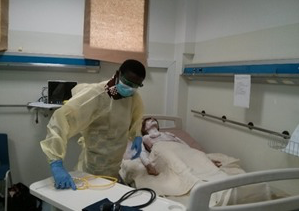Shaping the future: Our strategy for research and innovation in humanitarian response.

Shaping the future: Our strategy for research and innovation in humanitarian response.


“Behold the hands, how they promise, conjure, appeal, menace, pray, supplicate, refuse, beckon, interrogate, admire, confess, cringe, instruct, command, mock and what not besides, with a variation and multiplication of variation which makes the tongue envious.” Michel de Montaigne
The SAVE LIVES: Clean Your Hands global campaign was launched by the World Health Organization in 2009 and has become an annual tradition in many countries across the world. The role of unclean hands in cross contamination has long been recognized, and hand hygiene has proven to be an effective means to minimize the spread of infectious agents. Earlier this month, Global Hand Washing Day was celebrated.
Hand hygiene was a core component of the infection control training program we conducted at our primary and secondary training sites. In our pre-training simulated scenario involving a case of cholera, 39/93 (41.9%) participants performed hand hygiene with either soap or water before making contact with the patient. Forty nine (52.7%) participants performed hand hygiene after completing clinical tasks that required manual contact with the simulated patient.
When to perform hand hygiene?
The World Health Organization recommends the performance of hand hygiene at five crucial moments in clinical health care (Figure 1). These moments are:
1. Before patient contact.
2. Before performing aseptic techniques such as inserting central venous lines.
3. After body fluid exposure (e.g. after dressing a wound).
4. After patient contact.
5. After contact with a patient’s surroundings (e.g. after visiting a patient).
How to perform hand hygiene?
Hand hygiene should be performed with either:
• Alcohol-based Hand Rub/ Hand Sanitizers or
• Soap and Water
The use of Alcohol-based Hand Rub is appropriate for hand hygiene in routine clinical practice except when the hands are visibly soiled with dirt or body fluids or in the event of Clostridium difficile infection or outbreak. In these instances, hand hygiene should be performed with soap and water.
An evaluation of hand washing techniques has shown that the thumbs, webs of the fingers and palmar tips of the fingers are the most frequently missed areas during hand hygiene.
One recommended sequence for hand washing is as follows:
• Wet your hands with clean, running water (warm or cold), turn off the tap, and apply soap.
• Lather your hands by rubbing them together with the soap. Be sure to lather the backs of your hands, between your fingers, and under your nails.
• Scrub your hands for at least 20 seconds. Need a timer? Hum the “Happy Birthday song” from beginning to end twice.
• Rinse your hands well under clean, running water.
• Dry your hands using a clean towel or air dry them.
• If you have to manually turn off the source of running water, use a clean towel to do so. This will prevent recontamination of your hands.
In our post-training simulation sessions, 85/93 (91.4%) participants performed hand hygiene before coming in contact with the simulated patient in a Varicella infection simulation scenario, and 86% of these clinicians performed hand hygiene after completing their clinical tasks in the scenario.
The health workers and trainers trained during our infection control program in West Africa continue to disseminate infection control related knowledge and techniques to other health workers at their institutions. As part of a preemptive response to a Lassa Hemorrhagic Fever outbreak in Nigeria earlier this year, one of our partnering hospitals in Nigeria, University of Abuja Teaching Hospital, Gwagwalada held a hospital wide hand hygiene training exercise.
Please look for our updates on this blog to read more about our use of simulation to train health workers on preventative infection control measures.

 Please upgrade your browser
Please upgrade your browser
You are seeing this because you are using a browser that is not supported. The Elrha website is built using modern technology and standards. We recommend upgrading your browser with one of the following to properly view our website:
Windows MacPlease note that this is not an exhaustive list of browsers. We also do not intend to recommend a particular manufacturer's browser over another's; only to suggest upgrading to a browser version that is compliant with current standards to give you the best and most secure browsing experience.